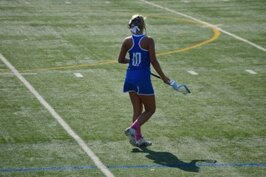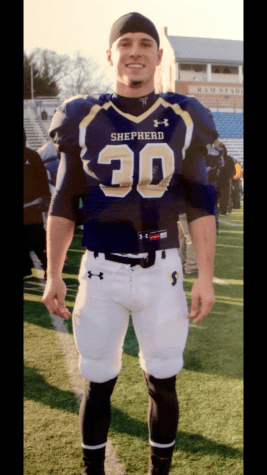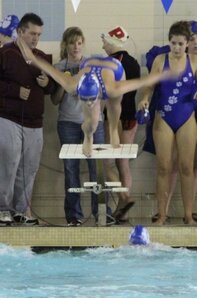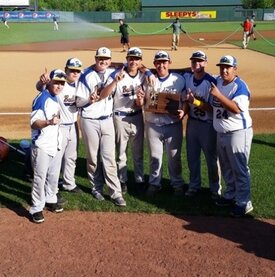(THE PICKET)—Being an athlete is something that sticks with you far after retirement. If you are classified as a N.A.R.P., that means you are a non-athletic regular person. Being a N.A.R.P. doesn’t have to be a bad thing, but it can really get to some people. Usually, a N.A.R.P. is someone who played sports in high school and didn’t continue their career in college, or someone who played in college and then quit.
Some people choose not to play their sport in college because they don’t want the time commitment, the physical strain on their body, or because they’re just tired of it.
Nate Saufley is a sophomore recreation and sport major Saufley played football his freshman year and quit after his first season because he didn’t like the position the coaches were having him play.
Since then, Saufley’s life has been different.
“I have a lot more time to focus on school, work and have free time to relax. As an athlete there was always a limited amount of time to get things done,” Saufley said. “My GPA went way up because I realized school was more important than football and put more time into studying.”
He also loves that he has time to go to the Wellness Center and play pick-up basketball.
“Although I miss playing football at times, I get a lot more sleep than I used to and enjoy being a regular college student,” he said.
Carli Zellers is a freshman nursing major who was playing lacrosse, but quit to pursue her passion and enroll in cosmetology school.

Carli Zellers, a freshman nursing major, can be seen on the field playing lacrosse.
Although Zellers didn’t have a full season under her belt, she conditioned daily with her team and played in an off-season tournament.
“I miss my teammates and always being with someone, but I don’t miss the conditioning,” Zellers said. “I was always busy and constantly had someone to do. I’ve been able to focus more on my studies.”
Nick Famer is a sophomore recreation and sport major who played football his freshman year but quit after the season so he could focus more on academics.
“I miss the bond and the brotherhood I had with my teammates and the physicality of playing football,” Farmer said, “But I love that I have so much free time.”

Nick Farmer, a sophomore recreation and sport major, played football here at Shepherd for a season but quit to focus on academics.
Athletes who loved their sport and were forced into early retirement because of a career ending injury or inability to get a scholarship may look at being a N.A.R.P. differently.
Sydney Izydore is a sophomore nursing major who played volleyball and swam competitively in high school. Izydore was forced into early retirement when she tore her rotator cuff in her right shoulder senior year. “I had offers to swim in college but was told by doctors that I could never swim competitively again,” she said.
Izydore said that it didn’t hit her until she went back to the West Virginia State Swim Meet last year how much she missed swimming.
“When I was swimming, I would always say, ‘I hate swimming, I can’t wait for it to be over,’ and then once it was over I realized how much swimming meant to me,” she said.
Like many people with their sport, swimming was her escape from everything.
“It was hard to make friends because I wasn’t part of a team,” she said. “I had to figure out how to make friends, and how to deal with stress in a new way.”
“Not having swimming made me depressed. It was so hard to go from having such a structured lifestyle around swimming to nothing.” She added.

Sydney Izydore, a sophomore nursing major, swam competitively in high school but was forced to stop because of an injury.
Yet she admits the positives of being a N.A.R.P. outweigh the negatives.
“If I would have swam, I wouldn’t have made good grades. Swimming was my life, it was all I did. Now I can focus on the rest of my life, like my future and becoming a nurse,” she said. “I know if I was still swimming I’d focus my time on that and not my future.”
Matt Crawford is a sophomore sport communication major who played baseball starting at the age of four, and started football in seventh grade, playing both throughout high school. Crawford didn’t play in college because even with a scholarship, the tuition was still too expensive.

Matt Crawford, who can be seen in the far right of this photo as #24 after winning the Maryland State Championship, played baseball and football for most of his life.
“Going from playing two sports to none was weird. With baseball I played during the summer but football just stopped out of nowhere,” Crawford said. “Coming into college I had a lot more free time. I had to learn how to juggle all my time without sports involved.”
Crawford said he doesn’t enjoy watching football and baseball from the stands. It just makes him want to play. The only positive things he could find about being a N.A.R.P. was that he had more opportunities to do things than when he was playing sports.
The main thing that stands out to Crawford about being a N.A.R.P. is that, “It’s sad that I can’t play anymore. I wish I could be out there.”

Leave a Reply